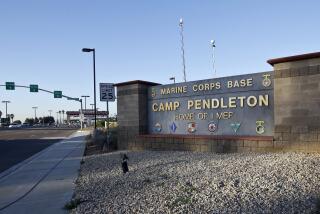Marine general was a war hero
- Share via
Retired Marine Lt. Gen. Victor H. “Brute” Krulak, celebrated for his leadership in World War II, Korea and Vietnam and for his authoritative book on the Marines, “First to Fight,” died Monday at Scripps Memorial Hospital La Jolla. He was 95 and had been in declining health for several years.
In a career that spanned three decades Krulak displayed bravery during combat and brilliance as a tactician and organizer of troops.
“Brute was very forgiving of young Marines who made mistakes,” said retired Col. G.I. Wilson, a combat veteran. “But he was hell on senior officers who preferred careerism and bureaucracy over decisive action. He detested those who lost sight of looking after their enlisted Marines and young officers.”
Born in Denver on Jan. 7, 1913, Krulak was a 1934 graduate of the Naval Academy -- where he picked up his nickname, a jest on the fact he was 5 foot 4. As a junior officer he served in Marine actions in Central America, where his views on counterinsurgency were formed.
In World War II, as a lieutenant colonel, he led a battalion in a weeklong battle as a diversionary raid to cover the invasion of Bougainville. Although wounded, he refused to be evacuated. For his bravery he was awarded the Navy Cross.
Under heavy fire from the Japanese, the Navy sent patrol boats to evacuate wounded Marines. Krulak befriended one of the young commanders, John F. Kennedy. Decades later the two shared a drink of whiskey in the Oval Office after Kennedy was elected president.
After World War II, Krulak held several key jobs, including commander of the 5th Marine Regiment and later chief of staff for the 1st Marine Division during the war in Korea. Later he served as commander of the Marine boot camp in San Diego and, from 1962 to 1964, as special assistant for counterinsurgency to the Joint Chiefs of Staff.
As commanding general of Fleet Marine Force Pacific he made 54 trips to Vietnam.
His ideas about mining Haiphong Harbor and relying on small unit actions in South Vietnam to win the support of the populace clashed with the strategy of Army Gen. William C. Westmoreland, commander of all U.S. troops from 1964 to 1968. He opposed Westmoreland’s decision to establish an outpost at Khe Sanh, which resulted in one of the bloodiest sieges of the war.
Krulak had hoped to become Marine Corps commandant, but President Johnson in 1968 nominated Gen. Leonard Chapman Jr. Krulak retired and began a second career as an executive for Copley newspapers and as a columnist. He retired as an executive in 1977 but continued to write.
In 1984, his book “First to Fight: An Inside View of the U.S. Marine Corps” was published, examining the history and culture of the Marine Corps. It remains on the official reading list for Marines and has been said to carry the DNA of the organization that prides itself on being the worst enemy that a foe of the United States can imagine.
“The Marines are an assemblage of warriors, nothing more,” Krulak wrote. He called on Marines to maintain a “religious dedication” to being ready to “go and win -- and then come back alive.” He disdained Pentagon bureaucracy and, even as he celebrated the Corps’ history, he called for Marines to “remain on the cutting edge of the technology that will keep its specialty effective.”
Bing West, former assistant secretary of defense in the Reagan administration and author of books on Marines in Vietnam and Iraq, said Krulak “was legendary for the depth of his intelligence.”
In a 2007 speech to the Marine Corps Assn., Defense Secretary Robert Gates praised Krulak for “overcoming conventional wisdom and bureaucratic obstacles thrown in one’s path.” Among other things, Krulak advocated that the Marines form a special forces unit when other Marine leaders opposed the idea.
All three of Krulak’s sons served in Vietnam: Charles and William as Marine infantry officers, Victor Jr. as a Navy chaplain. After retiring from the Marines, William followed his brother into the Episcopal clergy.
Charles, as a general, served as Marine commandant from 1995 to 1999, and followed in his father’s footsteps as an innovator and champion of the enlisted man. Along with his sons, Krulak is survived by four grandchildren and 10 great-grandchildren.
Krulak’s wife, Amy, died in 2001. Funeral services are set for 2 p.m. Jan. 8 at the chapel at Marine Corps Air Station Miramar.
--

